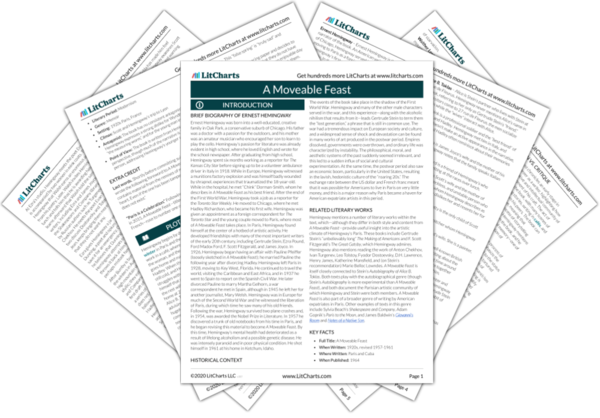Alcohol features significantly in A Moveable Feast, with both positive and negative associations. Hemingway enjoys drinking, and he mentions that in Europe alcohol was seen as a “normal” and “healthy” part of everyday life. Indeed, alcohol is such a major part of the normal routine of Hemingway’s day-to-day life that he admits that sometimes he skips meals, not because he doesn’t have enough money to afford food, but because he doesn’t see the appeal of eating without alcohol and he cannot afford both. Many of the scenes take place in cafés and bars over drinks, and alcohol is shown to fuel conversation between the characters. Hemingway’s descriptions of delicious drinks—such as the fruit liqueur served at 27 rue de Fleurus or the many wines he samples during his time in France—further underlines the impression that alcohol is a simple pleasure that enriches Hemingway’s life, a small luxury that makes life in Paris pleasurable (even for those like Hemingway and Hadley who are forced to live on a very small budget).
However, alcohol also has a decidedly sinister presence within the narrative. Many characters are shown to be in the grips of alcoholism, including Scott, Zelda, and Ford. Gertrude Stein accuses all men of Hemingway’s age of being a “lost generation” who drown the trauma and nihilism they inherited from serving in the war through reckless drinking. Scott and Zelda’s drinking clearly inhibits Scott’s ability to work and causes destructive conflicts between the two of them. Furthermore, many of the characters are described as suffering from physical ailments as a result of drinking. While Hemingway largely does not implicate himself in alcohol abuse or the negative physical effects of drinking, it is a well-known fact that Hemingway did have a destructive relationship with alcohol and that his physical and mental deterioration around the time that he was revising A Moveable Feast was at least partially the result of a lifetime of heavy drinking. However, at least in the context of his own experience, Hemingway largely presents alcohol in a positive light, as a vehicle for socialization, entertainment, and indulgence in life’s pleasures.
Alcohol Quotes in A Moveable Feast
No one emptied the Café des Amateurs though, and its yellowed poster stating the terms and penalties of the law against public drunkenness was as flyblown and disregarded as its clients were constant and ill-smelling.
All of the sadness of the city came suddenly with the first cold rains of winter, and there were no more tops to the high white houses as you walked but only the wet blackness of the street.
"All of you young people who served in the war. You are a lost generation…”
"Really?" I said.
"You are," she insisted. “you have no respect for anything. You drink yourselves to death. . .”
"'Was the young mechanic drunk?” I asked.
"Of course not."
"Have you ever seen me drunk?”
"No. But your friends are drunk.”
"I've been drunk" I said. “But I don’t come here drunk.”
"Of course not. I didn't say that.”
"The boy's patron was probably drunk by eleven o’clock in the morning." I said. “That’s why he makes such lovely phrases. "
"Don't argue with me, Hemingway,” Miss Stein said. “It does no good at all. You're all a lost generation, exactly as the garage keeper said."
Outside on the rue de l’Odeon I was disgusted with myself for having complained about things. I was doing what I did of my own free will and I was doing it stupidly. I should have bought a large piece of bread and eaten it instead of skipping a meal. I could taste the brown lovely crust. But it is dry in your mouth without something to drink. You God damn complainer. You dirty phony saint and martyr, I said to myself. You quit journalism of your own accord. You have credit and Sylvia would have loaned you money. She has plenty of times. Sure. And then the next thing you would be compromising on something else. Hunger is healthy and the pictures do look better when you are hungry. Eating is wonderful too and do you know where you are going to eat right now?
In Europe then we thought of wine as something as healthy and normal as food and also as a great giver of happiness and well-being and delight. Drinking wine was not a snobbism nor a sign of sophistication nor a cult; it was as natural as eating and to me as necessary, and I would not have thought of eating a meal without drinking either wine or cider or beer.

















